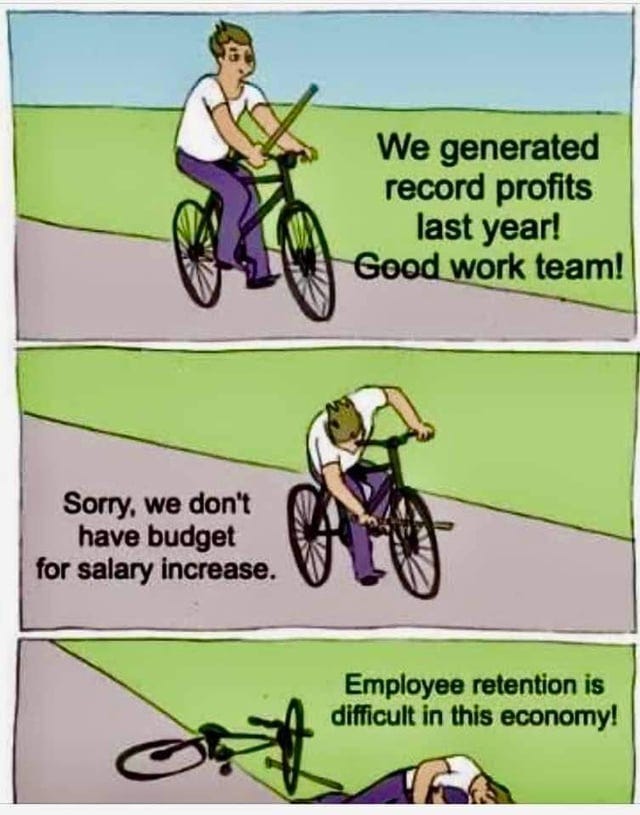The Jelly of the Month Club (Reprise)
Amazon freezes pay for thousands of managers after record profits
I published the original version of this piece back in December, when a number of CEOs took a break from counting their money long enough to cock the hammer on new rounds of layoffs despite healthy financial performance.
Today I am moved to refresh after Amazon dropped its latest bombshell, announcing a pay freeze for all of its Level 6+ managers.
The announcement, reportedly being shared with employees the same day it’s been shared with media, is a shock to the company’s spine.
Mid-level and senior managers and specialists were expecting at least token raises, if not something more, after the company banked $30.4B in profit across 2023, closing the year with its most profitable quarter ever.
Most in the impacted group were part of Amazon during the pandemic and recovery period, and are responsible for the superb delivery which recovered its share price after rocky macroeconomic conditions put a brake on profits and growth in 2022.
Not only do they get zero recognition of their discretionary effort and elite execution, but it’s all coming as a surprise.
I’ve spoken with many of my former Amazon colleagues today. They are universally deflated. The dominant view among them is that the company must want them to quit.
And that is what I expect will happen.
And it all makes me thing about Clark W. Griswold. So with context now established, enjoy the following.
If you are an employer, an employee, a prospective employer or employee, a former employer or employee, a fan of pre-millenium Christmas classics, or just someone fascinated by condiments, chocolates, pizza, or empty gestures, this update is for you.
Which should just about cover the whole of civilization.
The fictitious Clark Griswold understandably loses control of his emotions on Christmas Eve. Tearing into the long-awaited telegram containing his bonus, he’s expecting a check big enough to fund an in-ground pool.
And this seems reasonable. In the past year, he has unilaterally engineered a semi-permeable, non-osmotic, non-nutritive, crunch-enhancing cereal varnish which promises to boost his company’s revenues.
In the quaint universe of Christmas Vacation, we’re meant to believe that he still believes there is a link between the value added by an employee and the end-of-year remunerative gesture undertaken by the employer.
But we and Clark are introduced to the reality of declining horizons, that despairing hobgoblin of naivete.
Griswold receives not a bonus, but a subscription to a monthly condiment club.
Only after his supervisor is kidnapped, beaten, falsely imprisoned, and exposed to a supermajority of the torts available in civil litigation does this wayward, jelly-flogging grinch relent and restore Clark’s bonus.
But before that, as Griswold’s anger reaches its crescendo, he bombards his line manager’s good name with a number of creative aspersions, which we can economize here as “bug-eyed, spiny-lipped, snake-licking, inbred sack of monkey shit,” before chugging booze and pleading for Tylenol.
Griswold is a man over the edge.
Now let me offer an uneasy assurance if you are an employer.
I promise this is how your people feel at the end of the year when you, for want of the stones and/or authority and/or good sense to recognize them properly for the value they add, instead make an empty gesture.
As the end of the year approaches, has your business beaten financial projections?
If so, do you attribute this to the ingenuity, commitment, and discretionary effort (at personal sacrifice) of your team, or at least certain among them?
If the answer is yes to both, give them money.
Yes, money.
Not free donuts in the office introduced with a 30-second monologue pried from the pages of an airport bookstore self-help manual.
Not a t-shirt they can wear to work to commemorate the work they did to earn the t-shirt.
Not a water bottle or a keychain.
Not a ticket for a raffle. You didn’t profit by chance, but on purpose. Their purpose.
Not a donation to The Human Fund.
Not an occasional handful of chocolate candy delivered with a threadbare verbal offering of thanks (yes, Amazon, that one’s for you).
And please, for the love of God, not another pizza party, which fails on both substance and originality.
Look, I get it. Companies exist to make money. When they succeed, this should enrich those whose capital risk enabled their growth.
But this principle doesn’t stretch to oblivion. Or maybe I’m saying I hope it doesn’t, or wish it didn’t.
Companies that behave with a sense of fairness and justice earn the respect of their employees. Companies that properly recognize those who create value enjoy comparatively higher job satisfaction and retention.
Discretionary effort goes up along with innovation, costs of turnover come down, and the bottom line swells.
When people feel accurately recognized, expectations stabilize and they begin to trust. With trust and the sense of belonging that soon follows, you have the promise of a positive work experience, which is something employers should create and safeguard.
And the inverse of everything in the preceding paragraphs is also true.
But I have one more volley for those who say “but that extra profit goes to those who invest in us.”
Your employees invest in you too. It sounds obvious. But actions in the real world reflect that it’s scarcely understood.
Whether they hold shares in your company or not, your people are probably your biggest investor base. You get their vitality, their energy, their focus, their commitment.
You get most of their awake life. More than their families get when we count the time we typically count. Even more when we count the time off-clock when they are thinking of work, preoccupied with work, and doing work, usually in defiance of what’s best for their health and relationships, but in support of what’s best for the team and business.
If you want your people to feel about you the way Clark Griswold felt about Mr. Frank Shirley, shower them with penny chocolates or a slice of Aunt Bethany’s jello mold. Sure, it is “a cheap, lousy way to save a buck,” but it’s a move, and you won’t be alone making it.
But ideally, give them a slice of the commercial value they created. This is what every study, abetted by common sense, tells us they want in lieu of hollow gestures.
But my advice is that if you can’t or won’t provide monetary recognition for money-generating deeds, cross your arms, smile, and do nothing else.
You will at least spare the insult too often added to injury.
TC is a former senior operations leader in both commercial and military domains who writes and speaks on leadership. He is an expert in organizational leadership and the creation and development of high-performing teams.









